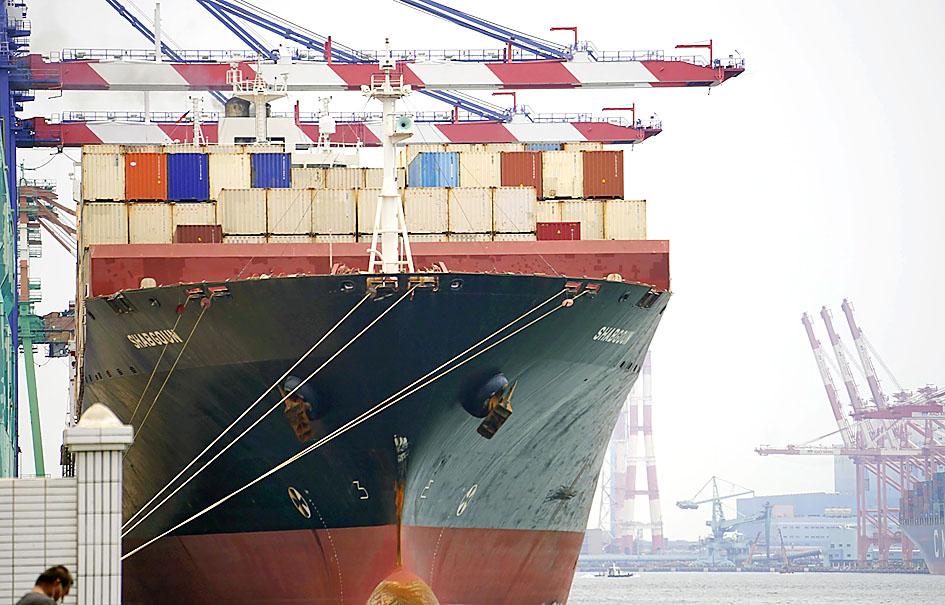Taiwan’s exports last month grew 29.2 percent year-on-year to a record US$39.65 billion, as demand for electronics used in digital transformation and new technology applications increased, the Ministry of Finance said yesterday.
Non-tech sectors also benefited from inventory replenishment demand, fueled by a continuing global recovery that allowed their growth to be faster than technology products, Department of Statistics Director-General Beatrice Tsai (蔡美娜) said.
The results outperformed her estimated gain of 23 to 27 percent despite fewer working days due to the Mid-Autumn Festival.

Photo: CNA
“All major product categories saw solid gains, although optical devices, mainly camera lenses used in smartphones and flat panels for laptops and TVs, only increased 4.8 percent, the slowest in 14 months,” Tsai said.
Demand from remote working and schooling lessened as vaccination rates improved around the world, she said, adding that China’s tightened controls of non-school educational facilities helped dampen buying interest.
That accounted for relatively lackluster showings for shipments of optical and memory products, as some suppliers opted to arrange annual maintenance of spare capacity.
Overall, exports of electronics rose 26.8 percent to US$16.58 billion, thanks to record chip shipments that swelled 27.6 percent year-on-year to US$15.11 billion, Tsai said.
Taiwan Semiconductor Manufacturing Co (台積電), the sole chip supplier for Apple Inc’s iPhone series, yesterday posted NT$152.69 billion in revenue for last month, the first rise above the NT$150 billion mark and representing a 19.7 percent upswing to a new high.
Shipments of information and communications products jumped 22.8 percent to US$5.4 billion, the ministry’s report showed.
Exports of base metal, plastic, chemical and mineral products posted steeper gains of between 32.5 and 139.8 percent from a year earlier as the US and Europe sought a return to normalcy despite ongoing COVID-19 infections.
Imports rose 40.4 percent to US$33.21 billion, as local semiconductor firms aggressively purchased capital equipment to meet business needs and upgrade technologies, the report said.
That gave Taiwan a trade surplus of US$6.45 billion, a decline of 8.6 percent from a year earlier, it said.
For the third quarter, exports advanced 30.1 percent, slightly missing the government’s August projection of 30.42 percent. Imports increased 42.5 percent, beating the forecast of 38.7 percent, the report said.
Exports are expected to remain vibrant this month with an increase of 21 to 25 percent and are likely to exceed US$40 billion, despite a high base last year, Tsai said.
For the first nine months, exports grew 30.7 percent to US$324.07 billion, while imports gained 33.3 percent to US$276.39 billion, the ministry said.

PATENTS: MediaTek Inc said it would not comment on ongoing legal cases, but does not expect the legal action by Huawei to affect its business operations Smartphone integrated chips designer MediaTek Inc (聯發科) on Friday said that a lawsuit filed by Chinese smartphone brand Huawei Technologies Co (華為) over alleged patent infringements would have little impact on its operations. In an announcement posted on the Taiwan Stock Exchange, MediaTek said that it would not comment on an ongoing legal case. However, the company said that Huawei’s legal action would have little impact on its operations. MediaTek’s statement came after China-based PRIP Research said on Thursday that Huawei filed a lawsuit with a Chinese district court claiming that MediaTek infringed on its patents. The infringement mentioned in the lawsuit likely involved

Taipei is today suspending work, classes and its US$2.4 trillion stock market as Typhoon Gaemi approaches Taiwan with strong winds and heavy rain. The nation is not conducting securities, currency or fixed income trading, statements from its stock and currency exchanges said. Authorities had yesterday issued a warning that the storm could affect people on land and canceled some ship crossings and domestic flights. Taiwan Semiconductor Manufacturing Co (TSMC, 台積電) expects its local chipmaking fabs to maintain normal production, the company said in an e-mailed statement. The main chipmaker for Apple Inc and Nvidia Corp said it has activated routine typhoon alert

GROWTH: TSMC increased its projected revenue growth for this year to more than 25 percent, citing stronger-than-expected demand for AI devices and smartphones The Taiwan Institute of Economic Research (TIER, 台灣經濟研究院) yesterday raised its forecast for Taiwan’s GDP growth this year from 3.29 percent to 3.85 percent, as exports and private investment recovered faster than it predicted three months ago. The Taipei-based think tank also expects that Taiwan would see a 8.19 percent increase in exports this year, better than the 7.55 percent it projected in April, as US technology giants spent more money on artificial intelligence (AI) infrastructure and development. “There will be more AI servers going forward, but it remains to be seen if the momentum would extend to personal computers, smartphones and

Catastrophic computer outages caused by a software update from one company have once again exposed the dangers of global technological dependence on a handful of players, experts said on Friday. A flawed update sent out by the little-known security firm CrowdStrike Holdings Inc brought airlines, TV stations and myriad other aspects of daily life to a standstill. The outages affected companies or individuals that use CrowdStrike on the Microsoft Inc’s Windows platform. When they applied the update, the incompatible software crashed computers into a frozen state known as the “blue screen of death.” “Today CrowdStrike has become a household name, but not in